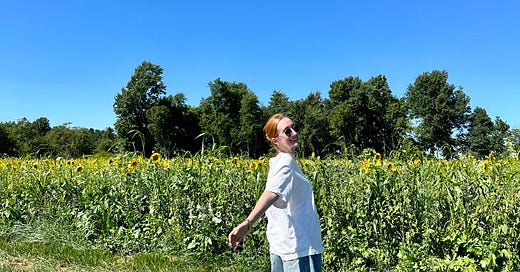Guest Entry: Farm Fields to Food Founder
Earth Day — which, for most people, comes and goes without notice — is more than a calendar holiday to me, it’s a reminder of why I changed my life.
By Alison Elliott, Founder of Farmer Foodie
Earth Day — which, for most people, comes and goes without notice — is more than a calendar holiday to me, it’s a reminder of why I changed my life. My journey to becoming a vegan was deeply rooted in my desire to live more sustainably: a decision that didn’t just change my diet and lifestyle, it also changed my career.
So, in honor of our lovely plant this Earth Day, I want to share how my green thumb and love for food and farming evolved into a mission-driven business. I’ve been a vegetarian for over 12 years, starting in college, where I minored in Sustainability Studies and took an environmental science course. I quickly learned about the harmful impact of industrial agriculture, from greenhouse gas emissions to soil degradation, and a class trip to the Rodale Institute, a leader in regenerative agriculture, made it apparent: the connection between food and climate change is impossible to ignore. I knew that plant-based eating could be a powerful personal action, so once home from Rodale, I committed to vegetarianism with an aspiration to go fully vegan. But I couldn’t stop thinking about cheese.
After graduating from Muhlenberg College in 2016, I spent the summer WWOOFing (World Wide Opportunities on Organic Farms/ volunteering on organic farms) across remote parts of Alaska, where I foraged wild berries, and experienced firsthand how food systems can be hyperlocal, seasonal, and sustainable. My host in Alaska loved to bake, and we’d often collect berries from trails to use in crumbles or crisps. I often found myself picking wild raspberries from a neighbor’s yard and folding them into pancake batter. These small, intentional acts of foraging and cooking with my findings connected me deeply to nature.
When I returned to New York, I became the Education Director at McEnroe Organic Farm, where I lived on-site for four years. I organized seasonal festivals, managed a one-acre garden, and taught about composting and soil health. These years rooted (no pun intended) my belief in food as both nourishment and activism. The farm taught me that the way we grow and consume food matters, not just for our health, but for the planet.
In January 2020, I launched Farmer Foodie as my plant-forward food blog. It started as a New Year’s resolution, but quickly became a daily passion. I’d wake up early to write recipes in the morning sun and fall asleep dreaming up new ones. Living and working on the farm gave me constant inspiration, and my kitchen became a test lab for what plant-based eating could look and taste like. But I still couldn’t stop thinking about cheese.
My journey continued when I was accepted into Brandeis University’s MBA program in Social Impact. I had once dreamed of owning a farm, but I knew the barriers to entry were high. Business school gave me the tools to strategically approach my goals and start imagining a sustainable food business that could reach far beyond my own kitchen and community. Along the way, Farmer Foodie stopped being just a blog, it became the seed of something much more impactful.
During my time in business school, I started to hone in on a problem: those thoughts about cheese. Personally, I had long felt vegan cheese sold in the supermarket often tasted...disappointing. I was craving a product that was clean, flavorful, and didn’t sacrifice on taste or nutrition.
That’s when Cashew Parm was born. What began as a homemade recipe soon turned into a packaged product — one that is shelf stable, sustainable, and free from dairy and gluten. Cashew Parm is made with Fairtrade organic cashews that are carbon negative when harvested, and clean organic spices, with a focus on sustainability in every step of the process, from sourcing to shelf.
Today, Farmer Foodie and Cashew Parm is more than a brand, it’s my way of creating change through food, and we’re building a community of conscious consumers who care about taste, impact, and the planet.
Now, every Earth Day, I’m reminded that each bite we take is a choice, and our food system plays a huge role in the climate crisis. Choosing plant-based products, buying from companies that prioritize sustainability, and supporting regenerative agriculture can all be part of the solution.
I know, first hand, that small shifts in what we eat can lead to big environmental impacts (and sometimes, big business ideas). Whether you’re foraging wild berries, growing your own herbs, or sprinkling Cashew Parm on your pasta, you’re participating in something powerful that the earth thanks you for.
Food should nourish both people and the planet. So, this Earth Day, let’s celebrate the delicious possibilities of plant-based cooking.




